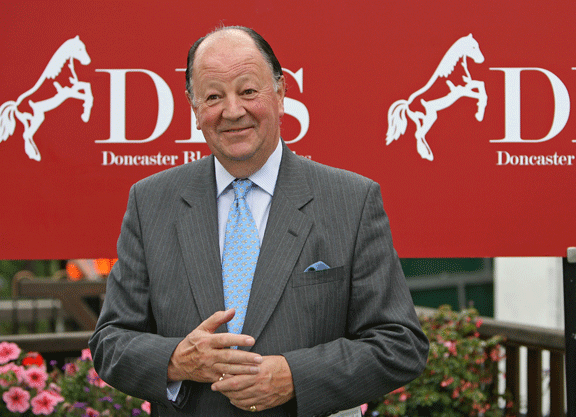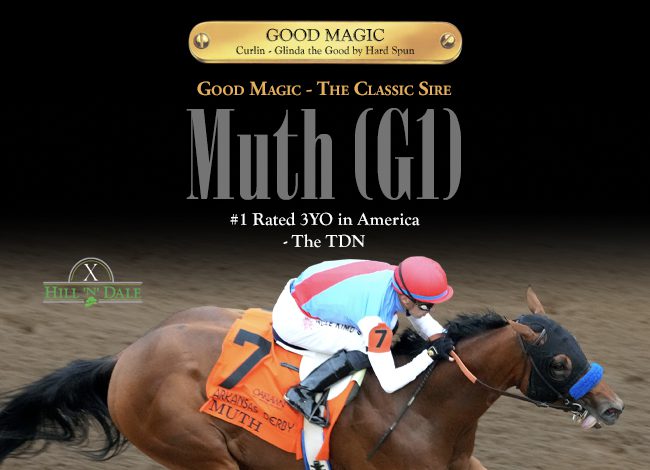By Emma Berry
Not a job, but a way of life. That's how Harry Beeby regards his long tenure at the helm of Doncaster Bloodstock Sales, and it is plain that this is still very much the case, almost six years after his retirement.
For the last three years, of course, DBS has been known as Goffs UK, following its merger with Goffs in Ireland back in 2007, but to those in the bloodstock world of a certain vintage it will always be 'Donny'.
Though the name has changed, some things have not. As the first sale of the year got underway last week at Doncaster, it was a safe bet that you would find Beeby, now 80, his wife Elizabeth at his side as always, with a bird's eye view of the sales ring on the balcony directly across from the auctioneer. From time to time throughout the day the auctioneer was his son Henry, now the Group Chief Executive of Goffs having joined DBS in 1982, some 20 years after the company was founded.
Not long after that 1962 inauguration the young Harry, son of the highly successful dual-purpose trainer George Beeby, was approached by the company's founding partners, Willie Stephenson and Ken Oliver, to join their fledgling venture. Though the company was named after the venue of the main sales arena in Yorkshire, its offices were then, and remain, in the Scottish Border town of Hawick.
“Originally the sales at Doncaster were conducted by Tattersalls,” recalls Beeby of the town's historic link between the St Leger race meeting and the yearling sales. “Up to 1957, Tattersalls had Glasgow Paddocks which was down in the town. The lease ended on that and they were offered a plot at the mile start on Redhouse Farm, but they decided, understandably, not to take this up. There was a gap between 1957 and 1962 when there were no sales here at all, and it was felt by the council, and the race committee in particular, that this was detrimental to the town and detrimental to the St Leger meeting.”
Like George Beeby—the trainer of Grey Sovereign (GB) as well as two Cheltenham Gold Cup winners—Stephenson and Oliver were both successful trainers. From his Royston stable, Stephenson became one of only five people to have trained the winners of both the Derby and the Grand National, while Oliver combined training with being the owner of Britain's oldest livestock auction, predominantly for sheep, in Hawick. It was this link which brought the duo together to set up in opposition to Tattersalls, which by that stage had a 200-year head start in the equine market.
“In 1962 the chairman of the race committee, alderman Albert Cammidge, approached Willie Stephenson to see would he be prepared to start sales up again in Doncaster,” says Beeby. “Willie thought he needed to have somebody who was an auctioneer to be with him, and he knew Ken Oliver very well. So they decided to go ahead in 1962 and they had one sale that year and two in the following year.”
Deciding they needed someone to run DBS full time while they conducted their fellow businesses, the partners had a man in mind for the role.
Beeby casts his mind back to that initial approach with impressive clarity. He says, “I was standing at Sandown on the bank watching racing in January of 1964 and Willie came up and started talking to me about Doncaster Sales, which I knew about because my father had come up to the first sale and bought the top lot. That was a positive, I think.
“He went away and we saw another race. And sure enough, I stood in the same spot and up he came and again started talking about Doncaster Sales. Then he said that they were looking for somebody to join them. I had a very good job at the time with the leading commercial property estate agents in London and I was enjoying that.”
He continues, “Anyhow, I thought about it and went to Royston to have dinner with Willie, and then the following weekend we caught the night sleeper up to Scotland, to Hawick. I'd never been north of Doncaster before in my life. We got out at 10 to six on a very cold February morning and Rhona Oliver came and picked us up and took us back to Hassendean Bank and we had the weekend up there with Ken. On Sunday, he went off to Ireland with the horses and we went back to London. And virtually, by then, I was going to join them. It was just as fast as that.”
That snap decision was clearly the right one. Having started his career as an auctioneer by offering the winner of a Hexham seller in May 1964—”It was on Whit Monday and the horse was called Beau d'Argent. He was bought in for 420gns,” recalls Beeby, quick as a flash—he brought his gavel down for the final time at the DBS Breeze-up Sale of 2013. Throughout his 49 years of service, he bore witness to many significant occasions in British bloodstock sales history, including the first breeze-up sale in Europe, held at Doncaster in the late 1970s, but there is one man and one horse who remain the most vivid in his memory.
“Over the years there have been some fantastic characters really,” he says. “Ginger McCain with his Red Rum. Undoubtedly the best horse I ever auctioned was Red Rum. I can remember it to this day exactly, where Ginger was standing, in the old complex, of course. Where Mrs. Brotherton, who was selling him, was sitting with Bobby Renton. In fact, he made 6,000gns and Ginger jumped from 5,000 to 6,000, which was his modus operandi of bidding very often. He enjoyed doing that. You couldn't dream that any horse could be as successful as he was.”
The history books reflect that the former winner of an Aintree seller as a 2-year-old would go on to make the Liverpool course his own, with a record three wins and two seconds from five consecutive appearances in the Grand National. What is not written there is how Red Rum is still one of the most recognisable names in racing more than two decades after his death in 1995 at the age of 30.
DBS can also boast of having sold the first horse ever to win the English and Irish 2000 Guineas, Right Tack, who sold for just 3,200gns in 1967. Other Classic heroes would follow, including Canford Cliffs (Ire), Turtle Island (Ire), Cockney Rebel (Ire), and Speciosa (Ire), who was the first breeze-up graduate to win a British Classic. More recently, the five-time Group 1 winner Laurens (Fr) has been added to the list of notable graduates, and she is certainly the best to have been sold under the Goffs UK banner.
What was the old St Leger Yearling Sale, now rebranded as the Premier Sale, is Beeby's favourite auction of the year and it has continued to break new ground in the last five years to bring extra kudos to the organisation, along with innovative new fixtures in the calendar, such as the Goffs London Sale.
Asked if he ever envisaged the sales house growing to such an extent from his early days of involvement, Beeby replies candidly, “No. To be perfectly honest, no. I thought there was scope for development, but I never dreamed that we'd reach the heights that we have. We've done it really on the basis of trying to make the whole thing into a family and being on a one-to-one basis with people. The personal touch is the one that we've always used and it's worked out very well. We were very fortunate that we had terrific contacts in Ireland. Initially, our Irish agent, Jack White, was very respected and terrific person. And he brought in Tim Hyde to join us. And we also had a connection on the National Hunt side with Padge Berry through Ken Oliver. We've always had tremendous support from Ireland and the Irish seem to love coming here. That's been a terrific asset to us.”
He adds, “We felt that the join-up with Goffs was a natural progression. We've always set out to try to give people an alternative to Tattersalls. Tattersalls is marvellous, absolutely fantastic. Make no mistake about that. But competition is a great thing, it is good in any walk of life in my view.”
Within his own company, it wasn't long before Beeby was facing competition from his own son, Henry, whom he credits as being “an outstanding auctioneer and a marvellous people person.”
Certainly mixing those two skills with an in-depth knowledge of the bloodstock world is the potent blend required for the peculiar job of equine ringmaster and showman. As a mentor to some of the younger members of the Goffs UK team, Beeby has doubtless proved invaluable and in honing his own skills in this area he remains indebted to Ken Oliver.
“He's who really drove me. We used to sit around the dining table and take bids off the wall and off the chimney and off this, off that. And it was even to the extent that he'd say, 'When you're lying in your bath, auction your toes just to get some flow going,' and things like that. It's all about confidence really.”
Confidence of course stems from knowing your subject matter, and in this regard Beeby was born for the job that he never considered to be a job. Not just the son of a trainer but the grandson of one of Britain's largest dealers of polo ponies and hunters, horse trading was very much in his blood from the start.
“It would seem to be,” he says with a smile before returning his attention to the sales ring below him.
Not a subscriber? Click here to sign up for the daily PDF or alerts.






